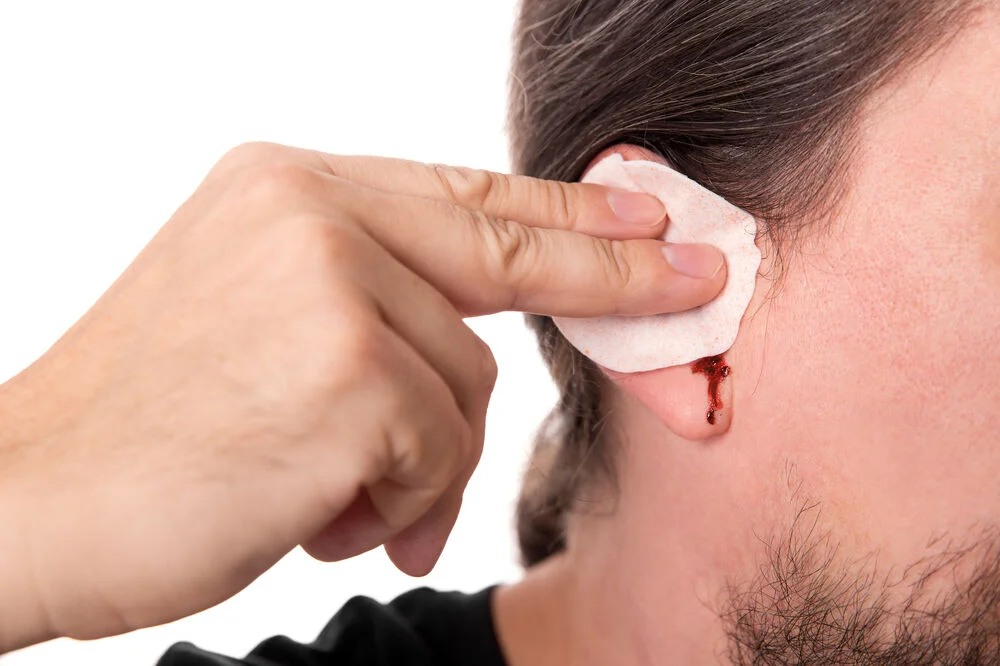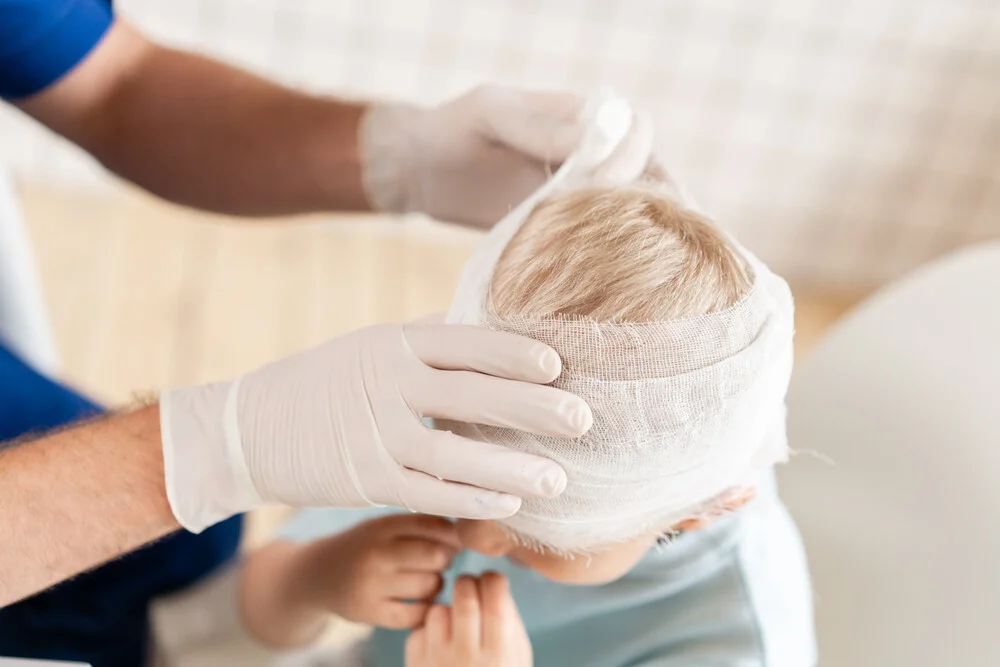Imagine a finely tuned musical instrument, carefully calibrated for perfect harmony. Now, consider the disruption caused by a sudden impact, throwing its balance into disarray.
Similarly, a head injury accompanied by ear bleeding can significantly affect the delicate structures of the ear, potentially leading to serious complications.
Understanding the causes and consequences of such an injury is essential for prompt and effective treatment.
In this article, we will explore the critical aspects of head injuries and ear bleeding, providing valuable insights to help safeguard your ear health and overall well-being.
Key Takeaways
- Head injuries can lead to inner and middle ear damage, potentially causing ear bleeding.
- Trauma to the ear can result in hearing loss and serious complications.
- Understanding the symptoms of ear injuries is crucial for prompt medical attention.
- Prevention measures like avoiding inserting objects into the ear can help protect against eardrum damage.
Understanding Head Injuries
Understanding head injuries is crucial for recognizing symptoms and seeking appropriate care promptly. Head injuries can range from mild concussions to severe traumatic brain injuries, each with its own set of symptoms and potential complications.
Common signs of a head injury include headaches, dizziness, confusion, memory loss, nausea, and even loss of consciousness. If you or someone you know experiences a head injury, it’s vital to seek medical attention immediately.
In some cases, head injuries can result in internal bleeding or swelling in the brain, which can be life-threatening if not addressed promptly.
It’s essential to monitor for any worsening symptoms after a head injury, such as persistent or worsening headaches, slurred speech, weakness in limbs, or changes in vision.
These could indicate a more severe issue that requires urgent medical intervention.

Common Causes of Ear Bleeding
When ear bleeding occurs, it can be caused by various factors such as trauma, infections, or foreign objects. Trauma to the ear, either from a direct blow or repeated injuries, can lead to bleeding.
Infections, like severe or untreated ear infections, may result in ruptured eardrums and subsequent bleeding. Inserting foreign objects into the ear, such as cotton swabs, can also cause damage and bleeding.
Exposure to loud noises, pressure changes from activities like scuba diving, or even barotrauma can be common causes of ear bleeding. It’s essential to be cautious with ear hygiene, avoid inserting objects into the ear canal, and protect your ears during activities that involve pressure changes.
If you experience ear bleeding, especially after a head injury, it’s crucial to seek medical attention promptly to determine the underlying cause and appropriate treatment.
Symptoms of Head Injury
If you notice ear bleeding following a head injury, pay attention to potential symptoms that may indicate the severity of the impact.
Here are some key signs to watch for:
Persistent headache
If you experience a continuous or worsening headache after the head injury, seek medical attention.
Nausea or vomiting
Feeling nauseous or vomiting post-head injury could be a sign of a more serious problem.
Confusion or disorientation
Difficulty in focusing, memory problems, or feeling disoriented are concerning symptoms.
Unequal pupil size
Check if one of your pupils is significantly larger or smaller than the other.
Weakness or numbness
Any weakness in limbs or numbness, especially on one side of the body, requires immediate medical evaluation.
These symptoms can be indicative of a more severe head injury that may require urgent medical intervention. It’s crucial not to ignore these signs and seek prompt medical assistance to ensure proper evaluation and treatment.

Immediate First Aid Steps For Head Injury with Ear Bleeding
Upon discovering a head injury with ear bleeding, promptly assess the situation and take immediate first aid steps to ensure the individual’s safety and well-being.
First, ensure the person is in a safe location and call for emergency medical assistance.
While waiting for help to arrive, gently tilt the individual’s head towards the injured side to allow the blood to drain out.
Avoid putting any pressure or inserting anything into the ear, as this can worsen the injury. Don’t try to clean the ear or remove any objects stuck in it.
Next, cover the injured ear with a sterile dressing or clean cloth to control the bleeding. Apply gentle pressure to the wound but avoid pressing directly on the ear.
Keep the person calm and reassure them while monitoring their vital signs.
Don’t let the individual eat or drink anything, especially if they’re feeling nauseous or dizzy.
Stay with the person until medical help arrives to provide further assistance and treatment.
Seeking Medical Help
After taking immediate first aid steps for a head injury with ear bleeding, the next crucial step is to promptly seek medical help to address the situation effectively.
When it comes to seeking medical help for a head injury with ear bleeding, remember:
- Time is of the essence
Don’t delay seeking medical attention.
- Inform healthcare providers
Provide details about the head injury and ear bleeding.
- Follow medical advice
Adhere to treatment recommendations for the best outcome.
- Monitor for changes
Keep an eye out for any worsening symptoms.
- Ask questions
Seek clarification on any concerns you may have about the treatment plan.

Potential Complications of Head Injury with Ear Bleeding
Complications from a head injury with ear bleeding can include potential long-term hearing issues and neurological damage. When the delicate structures of the ear are affected by trauma, it can lead to disruptions in the auditory system, causing hearing loss or tinnitus.
The inner ear houses critical components for balance and hearing, making it susceptible to damage from head injuries. Neurological complications may arise if the injury extends beyond the ear, affecting the brain’s function and potentially leading to cognitive deficits or motor impairments.
Prompt medical attention is crucial to assess the extent of the damage and implement appropriate interventions to mitigate these complications. Monitoring for any persistent symptoms like dizziness, headaches, or changes in hearing is essential post-injury to address any emerging issues promptly.
Recovery Process
Monitoring for any persistent symptoms like dizziness, headaches, or changes in hearing is essential post-injury to support your recovery process and ensure optimal outcomes for your long-term ear health.
It’s crucial to take proactive steps to aid your body in healing and prevent further complications.
Here are some key points to consider during your recovery:
- Follow your healthcare provider’s recommendations diligently.
- Rest and allow your body time to recover.
- Avoid activities that could worsen your condition.
- Stay hydrated to aid in the healing process.
- Keep a journal of any symptoms or changes you notice to discuss with your healthcare provider.
Preventing Future Injuries
To prevent future injuries, maintain awareness of your surroundings and use protective gear when engaging in activities that pose a risk to your ears.
Always be mindful of potential hazards, such as loud environments or situations where your ears may be vulnerable to trauma.
When participating in activities like sports, concerts, or industrial work, consider wearing ear protection like earmuffs or earplugs to safeguard against potential damage.
Additionally, avoid inserting objects into your ears, as this can increase the risk of ear injuries and infections.
Be cautious when cleaning your ears and use gentle methods recommended by healthcare professionals.
Regularly check the condition of your ears and seek medical attention if you experience any pain, discomfort, or changes in hearing.

Long-Term Ear Health
To ensure the ongoing well-being of your ears, maintaining vigilance over potential risks and utilizing protective measures remains essential for long-term ear health.
Here are five crucial tips to safeguard your ears for the long haul:
Regular Hearing Check-ups
Schedule periodic check-ups with an audiologist to monitor your hearing health and catch any issues early.
Limit Exposure to Loud Noise
Protect your ears by wearing earplugs in loud environments and keeping the volume at a reasonable level when using headphones.
Practice Ear Hygiene
Clean your ears gently and avoid using cotton swabs or other objects that can damage the delicate ear structures.
Stay Hydrated
Proper hydration can help maintain the health of your ear canal and prevent issues like earwax buildup.
Seek Prompt Treatment
If you experience any sudden changes in your hearing, ear pain, or other concerning symptoms, seek medical attention promptly to address any potential issues before they escalate.
Frequently Asked Questions
Can Head Injuries Always Be Prevented, or Are Some Accidents Unavoidable?
Sometimes accidents are unavoidable, but taking precautions can reduce risks. Head injuries may not always be preventable, but safety measures like wearing helmets or practicing caution in activities can help minimize the likelihood of severe incidents.
How Long Does It Typically Take for Ear Bleeding to Stop After a Head Injury?
If you experience ear bleeding after a head injury, it’s crucial to seek medical help immediately. The bleeding may stop on its own, but a doctor can assess the severity and provide necessary treatment for your safety.
Are There Any Specific Exercises or Activities That Can Help Improve Ear Health After a Head Injury?
To improve ear health post-head injury, try gentle exercises like jaw movements and neck stretches. Avoid loud noises and protect ears during activities. Good hygiene, hydration, and medical advice are crucial for recovery.
Can Head Injuries Lead to Permanent Hearing Loss, Even if the Ear Bleeding Stops?
If head injuries go untreated, they could cause permanent hearing loss even after the ear bleeding stops. It’s crucial to seek medical attention promptly to prevent long-term damage. Don’t delay in getting the necessary care for your condition.
Is There a Specific Type of Specialist That Should Be Consulted for Head Injuries With Ear Bleeding, or Can Any Doctor Handle the Treatment?
When dealing with head injuries and ear bleeding, consult an otolaryngologist for specialized treatment. While any doctor can provide initial care, a specialist can ensure proper evaluation and management to address potential complications effectively.
Conclusion
In conclusion, knowing how to recognize the signs of a head injury with ear bleeding and taking immediate first aid steps is crucial for protecting your ear health. Seek medical help promptly to prevent potential complications and ensure a smooth recovery process.
By understanding the causes, symptoms, and prevention of ear injuries due to head trauma, you can take proactive steps to safeguard your ears and overall well-being in the long run. Stay informed and empowered to prioritize your ear health.


